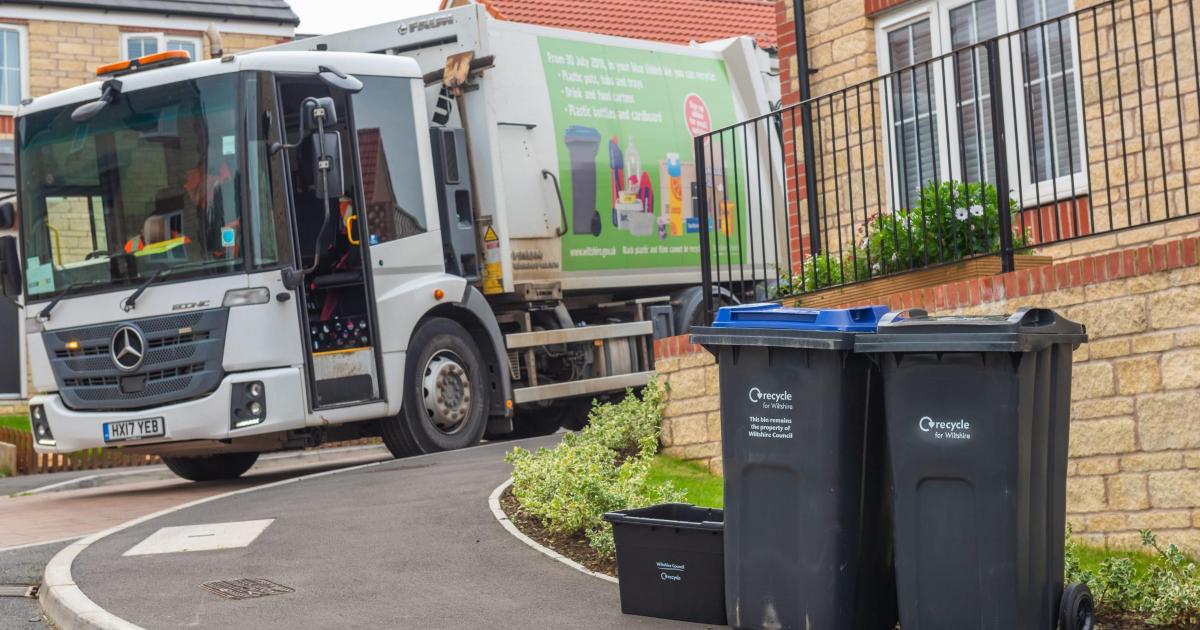Wiltshire Council’s Environment Select Committee was told on Tuesday (September 9) of plans to separate paper and card from plastic bottles and cans, currently collected together as mixed recycling in blue lid bins.
Food waste will also be collected from households on the recycling collection day as will soft plastics, for which Wiltshire Council will be providing plastic bags.
The remaining household waste will be collected normally in black bins, as per the current fortnightly collection schedule.
That means each Wiltshire household will have:
- One full-size bin for plastic, metal and cartons
- One full-size bin for paper and card
- One box for glass
- One container – size as yet unspecified – for food waste
- One full-size bin for residual waste
- One plastic bags for soft plastics, which will be deposited inside one of the recycling bins
The drive to further separate recycling by material type puts responsibility for sorting on the householder, rather than at the waste management facility.
A trial of red lid bins for plastic, cartons and metal is due to start for 600 residents of Chippenham in October, after containers are delivered next week.
From 2026 the recycling of food waste and soft plastics become statutory responsibilities of local councils although some, including Wiltshire, have been granted an extension as contracts with waste providers are still in force.
The committee was told that 43 per cent of Wiltshire’s kerbside residual waste – or in layman’s terms, the rubbish that is not put out for recycling – is food waste.
Wiltshire households produced nearly 39,000 tonnes of food waste in 2024/5.
Modelling suggests that 21,000 tonnes of food waste could be diverted to recycling.
The cost of implementing the scheme – including collection and processing the waste – would run into millions of pounds a year, but would cost less than the penalties the council faces by sending waste to landfill, said councillor Paul Sample, cabinet member for environment, climate and waste.
“This is something we need to deal with as rapidly as we can,” Cllr Sample told the committee.
Contracts with five of the seven private waste collection providers and facilities used by Wiltshire Council are due to expire in 2027.
The contracts are valued at £55 million a year and cost the taxpayer £45 million.
The council offsets some of this to the tune of £10 million by charging households for green waste an bulky waste collection – both optional services – and by selling glass bottles, tin cans, and paper.
Outside of the meeting, Cllr Sample told the Local Democracy Reporting Service: “Some of the materials collected through our recycling services, such as glass bottles, tin cans and paper, generate income once they are sorted and processed.
“In 2024/25, the council received £3.6 million from sale of recyclable materials collected at the kerbside and at our Household Recycling Centres.
“This income helps to offset the substantial costs of managing waste, although it does not cover them entirely. Nevertheless, it plays a valuable role in easing the overall financial pressure on the council.
“We continue to work hard to improve the quality of the materials we collect, not only through our award-winning ‘Let’s Sort It’ campaign, but also by actively engaging with residents and encouraging them to make the best use of the services we provide.
“Maximising recycling not only helps protect our environment, but any increase in income generated can also be used to offset the costs of managing the waste we all generate.
“In addition to recycling income, our chargeable garden waste and bulky item collection services generated £6.2 million in 2024/25.
“This income is ringfenced, meaning it is used exclusively to support the delivery of these specific services.
“The garden waste and bulky waste collection charge enables the council to recover operational costs such as staffing and vehicle expenses.
“However, the fees for these optional services are not allowed to include the cost of running composting sites or producing compost or disposing of bulky waste items.”
The committee agreed to form a task group to specifically look at waste collection and contracts.
